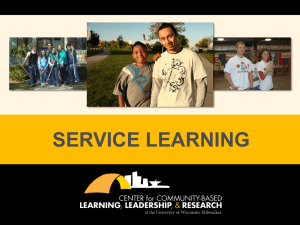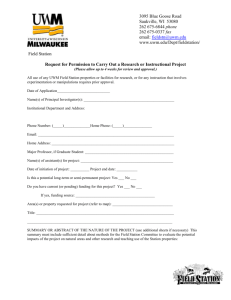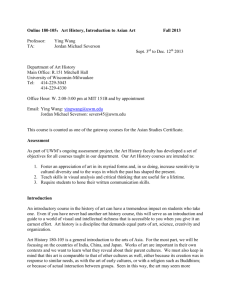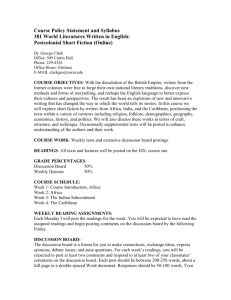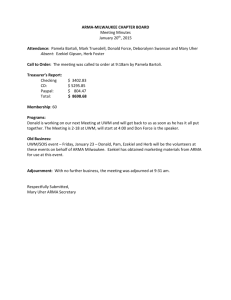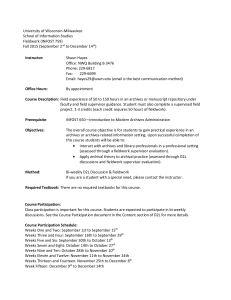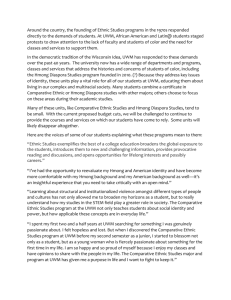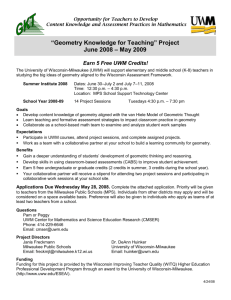Sociology 361/Research Methods in Sociology FALL 2014
advertisement
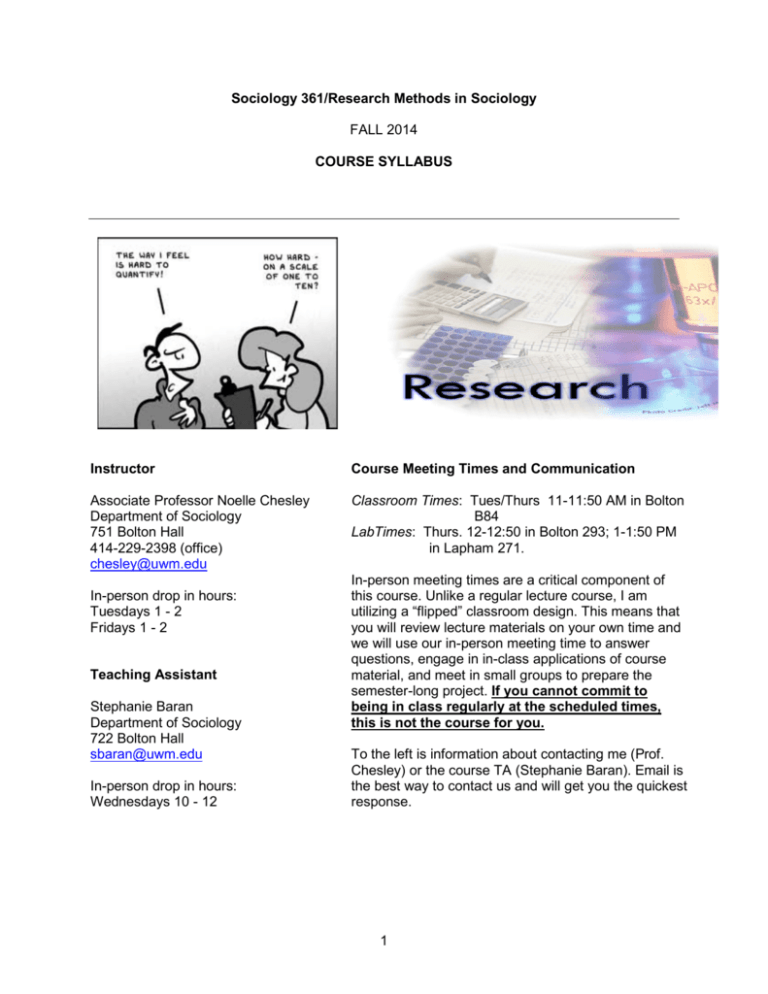
Sociology 361/Research Methods in Sociology FALL 2014 COURSE SYLLABUS Instructor Course Meeting Times and Communication Associate Professor Noelle Chesley Department of Sociology 751 Bolton Hall 414-229-2398 (office) chesley@uwm.edu Classroom Times: Tues/Thurs 11-11:50 AM in Bolton B84 LabTimes: Thurs. 12-12:50 in Bolton 293; 1-1:50 PM in Lapham 271. In-person drop in hours: Tuesdays 1 - 2 Fridays 1 - 2 Teaching Assistant Stephanie Baran Department of Sociology 722 Bolton Hall sbaran@uwm.edu In-person drop in hours: Wednesdays 10 - 12 In-person meeting times are a critical component of this course. Unlike a regular lecture course, I am utilizing a “flipped” classroom design. This means that you will review lecture materials on your own time and we will use our in-person meeting time to answer questions, engage in in-class applications of course material, and meet in small groups to prepare the semester-long project. If you cannot commit to being in class regularly at the scheduled times, this is not the course for you. To the left is information about contacting me (Prof. Chesley) or the course TA (Stephanie Baran). Email is the best way to contact us and will get you the quickest response. 1 Table of Contents WHY STUDY SOCIAL RESEARCH METHODS? ................................................................. 3 COURSE LEARNING OBJECTIVES.............................................................................. 3 REQUIRED AND RECOMMENDED COURSE MATERIALS ......................................... 4 CLASS FORMAT: A “Flipped” Classroom .................................................................. 4 TECHNOLOGY ............................................................................................................... 5 REQUIREMENTS AND GRADES .................................................................................. 7 Weekly “Module” Readings and PowerPoint Slides: .......................................................... 7 The Semester Long Consulting Project: ............................................................................... 8 Final Exam: ............................................................................................................................... 8 Grades: ...................................................................................................................................... 9 COURSE SCHEDULE .................................................................................................. 10 MY COURSE POLICIES AND REMINDERS ................................................................ 14 2 WHY STUDY SOCIAL RESEARCH METHODS? How can we document the existence of discrimination? Are citizens in the United States happier than residents of other countries? Is income inequality among Americans increasing or decreasing? Are black criminals more likely to receive a death sentence than white criminals? These are the sorts of questions that social scientists address every day using established research methods. Knowledge about and experience with developing and implementing research studies is a highly-valued skill that is applied in a variety of environments, including universities, non-profit organizations, government, and private-sector firms. In practical terms this course is designed to prepare you for involvement in a range of independent research projects that you may encounter in your roles as student, employee, or engaged citizen. COURSE LEARNING OBJECTIVES Development of Social Science Skills Students completing this course will gain an understanding of: The theoretical and philosophical perspectives that underlie different approaches to empirical investigations in sociology; The range of ethical issues that one might face in designing and implementing a research project; Key issues in sampling and measurement; The specific techniques that scientists use to gather information about social phenomena; The various ways that sociologists analyze information from social research studies; How social scientists demonstrate cause-effect relationships in social research. Development of Transferrable Skills Completing the activities associated with this course should help you progress in your ability to: Think critically. Design/evaluate/analyze existing or proposed research studies; Create Knowledge. Synthesize and integrate information from a variety of sources pertaining to a complex social problem, pose questions that follow from existing research, link research questions and their potential solutions to course concepts; Solve Problems. Think about problems and their solutions in multiple ways; seek information from a variety of sources; Formulate and Support Arguments. Distinguish evidence-based arguments from those based on personal experience or morals. Apply these arguments in your own speaking and writing to “make a case” for a particular interpretation or conclusion. Critique conclusions from research through effective communication to classmates. Engage with other learners through active listening and sharing ideas; Evaluate the work of peers. Constructively critique the arguments and conclusions of others. Offer suggestions for improvement in research design or evidence-based writing; engage with other learners through active listening and sharing ideas. Complete a central task in a team-based environment. Work with peers over the course of the semester to plan, manage, and complete a client-based consulting project. 3 REQUIRED AND RECOMMENDED COURSE MATERIALS 1. Required: Investigating the Social World, 7th Edition, by Russell K. Schutt. Pine Forge Press, Thousand Oaks, CA. This book is available in the UWM bookstores and on reserve in the library. You need the 7th edition, earlier editions will not suffice. This text is widely available in print from a variety of online vendors for $50-$55. I have also seen online rental prices in the range of $30 for the semester. A Note About the Required Text. Several semesters ago, one of my students failed this course. She told me later than one of the main reasons she did not do well is that she did not purchase the text (she was able to pass in a subsequent semester). The readings in the text are heavily emphasized in this course and will be used in lab materials, in-class applications, and exams. In my experience, it is difficult to master the material we will cover this semester without reading this text. You need the correct edition of the textbook in order to do well in this course! 2. Strongly recommended: A writing style guide of your choice. A popular and inexpensive volume is William Strunk and E.B. White’s (1999) The Elements of Style, which is available everywhere. Other materials mentioned on the course schedule can be downloaded from the course website. CLASS FORMAT: A “Flipped” Classroom Many college courses use a lecture format. Students come to class and listen to an instructor deliver a planned lecture on a particular topic. Discussion with the instructor, or time for questions may or may not be part of that experience. Learning in these environments is generally more passive, where students are expected to listen, take notes, and absorb (and hopefully think critically about) the information presented. In a flipped classroom, students use online tools to review lecture materials on their own time (and to view them multiple times, if necessary). In-person meeting times with the instructor and the rest of the class are reserved for answering questions or otherwise discussing the topic at hand, applying new ideas through in-class exercises, and project work. An important component of this course design is a very different role for the instructor. Rather than acting as the “sage on the stage,” in a flipped classroom, the instructor works more collaboratively and cooperatively with students. Expectations are different for students, as well. The flipped model means that you, as a student have to be very actively engaged in this process. You are more responsible for your own learning, but there should also be more room to experiment, too. In a nutshell, what this means is that our class meeting times are more critical than ever. This is the time we will use to meet to go over course concepts, apply them in new ways, and work together on the semester-long consulting project (which constitutes a large part of your course grade). If you miss class, there is no way to make it up. Unlike a lecture course where you can get notes from another student, or review the lecture slides, the class time is interactive and will progress much more organically than in a planned lecture. 4 You can plan to spend approximately 10 hours a week on this course. This will include time spent online reading lectures or other course material, coming to class and lab, completing assignments, and studying for quizzes and exams. You will also spend time completing the course reading, creating posts for the discussions, and researching and writing for the research proposal project and lab assignments. For a bit more information about this classroom format, see “Seven Things you Should Know About Flipped Classrooms” on the course website. TECHNOLOGY Course Site. The Learning Management System used at UW-Milwaukee is Desire to Learn, sometimes called D2L, and is available at https://idp.uwm.edu/idp/Authn/UserPassword. Need Help? Any problems with access to D2L, please contact help@uwm.edu or call (414) 2294040.The Help Desk can help you with your technical issues with the class. For more information about how to use the latest version of D2L visit: http://uwmltc.org/?p=8690. Hardware. To successfully participate in learning environment that incorporates online materials, you will need routine access to a computer that has a broadband connection. You should have regular access to a desktop or laptop computer that is capable of accessing the course site and course materials. Software. On your computer, you will need to be able to view, edit, and create Word and PowerPoint files. You will also need to be able to view Adobe PDF (portable document files, .pdf) files. Internet. UWM recommends the use of a broadband Internet connection in order to efficiently and effectively download course materials Email. Email will also be used. Make sure to put me and the TA in your address book. If you do not use your UWM e-mail, you can find information on forwarding your e-mail at: https://pantherlink.uwm.edu/. I will routinely use your UWM address, so please make sure you can receive email sent to this address. Tips for Email Use in this Class Please place the phrase “Soc. 361:” followed by the specific subject of a question/email in the subject line of all emails to me or the TA. We all get email from a variety of sources and placing this information in the subject line of emails will allow all of us to more easily sort and locate important course emails. I also ask that students use greetings (e.g., Dear Professor Chesley) and closings (e.g., Sincerely, Cordially) in their emails, as well as avoiding the use of acronyms (e.g. OMG, LOL). I would like you to use this class as an opportunity to polish your professional online communication skills. Here is an example of the email format I would like to see you use in this course 5 From: "Noelle Chesley" <chesley@uwm.edu> To: "Student X" <studentX@uwm.edu> Sent: Thursday, July 26, 2012 1:51:32 PM Subject: Soc. 361: Question Dear Student X: Thank you for your email. You asked about further resources for pursuing your research project for 361. I suggest you search SocAbstracts using the following search terms “income inequality” and “stratification.” Best, Prof. Chesley I typically check my email twice per day (morning, afternoon) Monday through Friday unless I am out of town or scheduled in all-day meetings. I do not routinely check email on weekends. In general, I will get back to you within 24 hours (often much sooner) M – F, but will not respond to email sent after Friday afternoon until Monday morning. Getting the Technology Right. Not having access to technology or the appropriate technology to complete course requirements is not a valid excuse for incomplete work. You must be willing to obtain access to the needed hardware, software, and Internet. You must be willing to check your e-mail Monday through Friday and access the course site as much as needed. If you are not willing to do these things, then you should consider dropping this class.. 6 REQUIREMENTS AND GRADES You will participate in a number of different course activities designed to help you learn and apply social research methods. These include: carefully reading course materials devoted to a topic prior to classroom time, participating in class discussions and in-class applications, completing quizzes to assess your understanding of module materials, working in teams on a semester-long consulting project, and taking a comprehensive final exam. More detail about these course activities is provided below. Weekly “Module” Readings and PowerPoint Slides: Because we are no longer bound to the traditional 50 or 75 minute lecture to deliver necessary information, the course is organized around a series of topics that build on one another rather than what can be covered neatly during a prescribed lecture slot. Each of these topics is called a “module” and we will complete 12 different modules related to research methods this semester. We spend roughly one week on each module. Readings will be available via your text and online. The reading material is intended to provide you with foundational knowledge of social research methods that can be used as a springboard for other activities in the course. PowerPoint slides and notes are used to emphasize, supplement, and clarify key material from the reading. You should also review these outside of class. Please note that the current PowerPoint view in D2L shows slides, but not the notes section that goes with each slide. I often have detailed notes that accompany a slide. I recommend downloading the slides and viewing them in notes view on your computer. My plan is that we will use our Tuesday meeting time to go over any questions students may have about that weeks’ topic. This means you need to complete the course reading and review of PowerPoint slides before we meet at 11 am on Tuesdays. We will also use that Tuesday meeting time to engage in a hands-on application of the week’s topic. While these will be graded, they are low-stakes assignments designed to help you see how well you grasp some of the key points from that week’s module. Lab time on Thursday will be used, in part, to complete a quiz (typically 5 – 10 questions) on the week’s topic. This quiz structure allows you to get regular, early feedback on how well you grasp a particular topic. In-class work on Tuesdays will be graded and will be worth up to 5 points. Weekly quizzes (administered in lab on Thursdays) are worth 10 points. Lowest grades on both will be dropped when computing your final grade. My Philosophy Regarding PowerPoint Slides. PowerPoint slides are provided as supplements to (not replacements for) the required text. Previous students have recommended that I incorporate voice-over PowerPoints into this course, however, I have made the decision not to do this. The central reason for this decision is that providing a verbal recording to accompany the slides is incredibly time-consuming (think about how many tries you can take to get your phone greeting the way you want it) and this time commitment impedes me from making corrections and updates to the slides on an as-needed basis. With the current slide/notes format, I can easily make corrections or additions to the slides at a moment’s notice, which I see as a critical element of making this course work as effectively as possible. I can’t tell you how many times students let me know about mistakes on slides, or that something 7 wasn’t clear enough. I always try to fix those problems right away and addressing them is made much more difficult if I have to re-record the voice material every time. The Semester Long Consulting Project: To make this course as true to life as possible, I have designed it to include a consulting project, complete with client (me!). You will work weekly, in small groups in class, to help me specify the problem I am facing, identify a research design that will provide further information about this problem, collect and analyze data using the methods we discuss in class, and make recommendations on the basis of your research. While you will work in teams to collectively formulate a series of research questions and select an appropriate design, collect data, and analyze it to address these questions, each student will write an individual report to showcase his/her understanding of the research process. You will complete the report in stages, with a final report due at the end of the semester. We will typically devote class time on Thursdays to the consulting project. This means there will be built-in time to meet in your teams to plan and manage your projects and do your data collection. Each group will also be able to consult with me each week to ask questions or get feedback on the teams’ approach. I also expect that some lab time will be available for teams to make progress on the consulting project. You will be assessed by your team members on your group contributions beginning in week 2 through week 12. Each group member will rate each other group member on the quality of his/her overall contribution to the team on a weekly basis (you won’t rate yourself). Ratings are averaged and earning a total of 50 points is possible over the course of the semester. NOTE: Another thing I am hoping we can experiment with this semester is having some teams do modules 4 – 9 out of the order I have listed in the class schedule. It may be that some teams will know fairly early on that they will want to field a survey. In that case, they should start learning the survey material as soon as possible. Another team may want to try an experimental approach, in which case they would need to access and learn the material on experiments sooner rather than later. I plan to work individually with teams to help each group assess what the best approach might be as soon as possible and map out a plan for working through the course materials to best fit the needs of that group. Final Exam: Social research methodology is a knowledge area with specific terminology and techniques. Future employers (or graduate programs) will expect that you have developed a basic familiarity with a number of subtopics in this area, including sampling, measurement, experimental and survey design, qualitative methods, and a range of quantitative and qualitative techniques for data analysis. The comprehensive final exam is designed to assess your basic understanding of all of these subtopics, regardless of the focus of your own research for the class and final report. 8 Grades: You can track your grades for all of your assignments on D2L. Summary of Assignments and Point Values: Assignment Development of Final Client Report Group Charter Statement of Problem Memo Peer Review of Statement of Problem Memo Client Report; Draft 1 Client Report; Draft 2 Final Client Report Team Semester-based Assessment Topic Quizzes (11 @ 10 points each; lowest score dropped) Topic In-Class work on Tuesdays (11 @ 5 points each; lowest score dropped) Comprehensive Final Exam TOTAL Points for Assignment 10 20 10 35 35 45 50 100 50 100 455 Grading Structure for Final Grade: Letter Grade A AB+ B BC+ C CD+ D F % of Total Points 93 90 87 83 80 77 73 70 67 63 Below 63 **** IMPORTANT: You must turn in a final report in order to pass the course **** 9 COURSE SCHEDULE Week Assignments and Due Dates: Before Tuesday Tuesday Class Week 1 9/2 – 9/5 Before Thursday Course Introduction 1) Goals and Structure of the Course 2) The Flipped Classroom 3) Creation of Media Policy Week 2 9/8 – 9/11 Topic 1 Overview of the Research Process; 1) Read Ch. 1 & 2 2) Review Slides 1) Questions about Course Material 2) In-Class Exercise Applying Course Material Week 3 9/15 – 9/19 Topic 2 Research Ethics and Philosophies; 1) Read Ch. 3; 2) Review Slides 1) Questions about Course Material 2) In-Class Exercise Applying Course Material 10 Thursday Class Thursday Lab Read: 1) Overview of Client Project Handout; 2) The Team Charter Assignment; 3) Difference Matters, Ch. 1 Overview of Client Project 1) Meet the client 2) Team Building Exercise 3) Brainstorming session to target your individual and group research efforts Establish Team Processes Read: Statement of Problem Memo Assignment instructions. Client Project: 1) Start formulating research questions that will be addressed by members of the group. QUIZ 1: The Research Process Client Project: Institutional Review Boards and Your Responsibilities as a Student Researcher QUIZ 2: Research Ethics and Philosophies DUE: Group Charter (upload to D2L by end of LAB). Week Week 4 9/22 – 9/26 Assignments and Due Dates: Before Tuesday Tuesday Class Topic 3 1) Questions about Overview of Sampling Course Material Methods; 2) In-Class Exercise 1) Read Ch. 5; Applying Course 2) Review Slides Material Before Thursday Read: Statement of Problem Memo: Peer Review Assignment instructions. DUE: Statement of Problem memo (2 copies; in class) Week 5 9/29 – 10/3 Week 6 10/6 – 10/10 Week 7 10/13 – 10/17 Topic 4 Qualitative Methods 1) Read Ch. 9 and the Nathan Readings; 2) Review Slides Topic 5 Conceptualization and Measurement in Quantitative Research 1) Read Ch. 4; 2) Review Slides 1) Questions about Course Material 2) In-Class Exercise Applying Course Material Thursday Class Client Project: Identify a sampling strategy for your team Thursday Lab QUIZ 3: Sampling Client Project: QUIZ 4: Qualitative Methods Establishing research design and data collection plan 1) Questions about Course Material 2) In-Class Exercise Applying Course Material Read: Client Report: Assignment instructions. Client Project: Establishing research design and data collection plan QUIZ 5: Conceptualization and Measurement DUE: Peer Review of Statement of Problem memo (in class). Topic 6 Research Design and Causation 1) Read Ch. 6; 2) Review Slides Client Project: Data Collection 11 QUIZ 6: Research Design and Causation Week Week 8 10/20 – 10/24 Week 9 10/27 – 10/31 Assignments and Due Dates: Before Tuesday Tuesday Class Topic 7 1) Questions about Experiments Course Material 1) Read Ch. 7 2) In-Class Exercise 2) Review Slides Applying Course Material Before Thursday Thursday Class Client Project: Data Collection Thursday Lab QUIZ 7: Experiments QUIZ 8: Survey Research Topic 8 Survey Research 1) Read Ch. 8 2) Review Slides 1) Questions about Course Material 2) In-Class Exercise Applying Course Material Client Project: Data Collection Week 10 11/3 – 11/7 Topic 9 Secondary Data Analysis and Content Analysis 1) Read Ch. 13 2) Review Slides 1) Questions about Course Material 2) In-Class Exercise Applying Course Material 3) Questions about Client Report: Draft 2 Client Project: Data Collection/Analysis QUIZ 9: Secondary Data Analysis and Content Analysis Week 11 11/10 – 11/14 Topic 10 Data Analysis: Quantitative Approaches 1) Read Ch. 14 2) Review Slides 1) Questions about Course Material 2) In-Class Exercise Applying Course Material Client Project: Data Analysis QUIZ 10: Quantitative Data Analysis Topic 11 Data Analysis: Qualitative Approaches 1) Read Ch. 10 2) Review Slides 1) Questions about Course Material 2) In-Class Exercise Applying Course Material Week 12 11/17 – 11/21 12 DUE: Client Report, Draft 1 (D2L by 10 AM) DUE: Client Report, Draft 2 (D2L by 10 AM) Re-Read: Client Report: Assignment instructions. Client Project: Data Analysis QUIZ 11: Qualitative Data Analysis Week Week 13 11/24 – 11/2 Week 14 12/1 – 12/5 Week 15 12/8 – 12/11 Assignments and Due Dates: Before Tuesday Tuesday Class Topic 12 Discussion of Prof. Evaluation and Policy Chesley’s evaluation Research project with Racine 1) Read Ch. 11 County YMCA Review Slides Class Debrief: What worked? What needs improvement? Exam or Report questions? Before Thursday Thursday Class Thursday Lab THANKSGIVING RECESS NO CLASS DUE: Final Reports (D2L by 5 PM) 13 Clarifying Material for final exam/consultations about final reports Lab Time reserved for team or individual meetings, as needed. Optional Class: Last minute exam questions? Online Final Exam Administered in LAB MY COURSE POLICIES AND REMINDERS How to Do Well in This Class This is a class in which ideas and concepts build on one another. This means that mastery of material covered early in the course is necessary to fully grasp ideas and concepts that come later in the course. It is very important that you: • Actively read the course materials (take notes while you read); • Make the material relevant by using course assignments to explore questions you are interested in or care deeply about; • Participate—engage with others in group discussions and activities. Academic Misconduct • By becoming a student at UWM, you have agreed to abide by the University’s code of conduct, including its provisions on academic misconduct. I take this obligation very seriously. In cases of academic misconduct, I will award a grade of F (zero points) for the entire assignment AND usually for the entire course, as well as pursuing disciplinary action. • The University defines academic misconduct as “an act in which a student seeks to claim credit for the work or efforts of another without authorization or citation, uses unauthorized materials or fabricated data in any academic exercise, forges or falsifies academic documents or records, intentionally impedes or damages the academic work of others, engages in conduct aimed at making false representation of a student's academic performance, or assists other students in any of these acts.” We will discuss plagiarism in class, but check with me if you are unsure about proper citation and use of others’ work. If you are not familiar with UWM’s policies on academic misconduct, I encourage you to review them at http://www.uwm.edu/Dept/Acad_Aff/policy/academicmisconduct.html. Late Assignments, Make-ups, and Incompletes • Each assignment must be turned in, as noted in the course calendar, by the date and time noted in order to receive full credit. Unless otherwise stated in a specific assignment, assignments will be penalized a letter grade for each 24 hour period they are late. • Incomplete coursework is a major inconvenience for both students and instructors. I expect you to do everything in your power to complete all coursework by the time it is due. A notation of "incomplete" may be given in lieu of a final grade to a student who has routinely completed course requirements but who is unable to take or complete the final examination or to complete some limited amount of term work because of circumstances beyond the student’s control. An incomplete is not given unless the student can document an illness or other emergency beyond the student's control. Grading Grievance Process It is always possible for a test to be scored incorrectly by the computer (although rare, it does happen), for an exam question to have two or more equally good answers, or for me or the TA to miss a point you are trying to make in an essay or paper. If you believe that a test or assignment was incorrectly graded, please follow this procedure: Within one week of receiving a graded test or assignment, submit a written "appeal" describing the basis for your opinion (e.g., citing a passage from the text that supports your choice of an answer) to Professor Chesley or the TA. This appeal need not be lengthy - a short paragraph will often do. In appealing a grade, it is not sufficient to argue that your answer was reasonable given your implicit 14 assumptions. You must convince Professor Chesley and the TA that the answer you chose was as good as or superior to the one identified as correct. Feedback, Getting Help, and Course Recommendations • You will have an opportunity to evaluate the course at the end of the semester. I also typically do a mid-course evaluation. In the meantime, I am eager to hear from you during and after class. Feel free to contact me with questions, worries, or other constructive feedback. • I have high standards for my students. Grades of “A” are reserved for work that illustrates mastery of course concepts and also engages course materials with creativity and care. At the same time, I do not want students to feel overwhelmed or lost in the course. Contact me or your TA if you want to discuss your class performance. • For help with writing – a key part of this course – I strongly recommend consulting the UWM Writing Center (http://www4.uwm.edu/writingcenter/) @ 229-4339, or by email: writing@uwm.edu • Many of you will require recommendations for graduate programs & scholarships, or references for a résumé. As an added incentive for doing well in this class, I will write graduate school recommendation letters for any student who receives an Aor better in the course with regular course participation. I will serve as a reference on a résumé for students who earn a B or better in the course. 15 UNIVERSITY AND SOCIOLOGY DEPARTMENT POLICIES The Secretary of the University maintains a web page that contains university policies that affect the instructor and the students in this course, as well as essential information specific to conduct of the course. The link to that web page is: http://www4.uwm.edu/secu/SyllabusLinks.pdf Students with Disabilities. Verification of disability, class standards, the policy on the use of alternate material and test accommodations can be found at the following: http://www.uwm.edu/Dept/DSAD/SAC/SACltr.pdf Religious Observances. Policies regarding accommodations for absences due to religious observance are found at the following: http://www4.uwm.edu/secu/docs/other/S1.5.htm Students called to active Military Duty. Accommodations for absences due to call-up of reserves to active military duty are found at the following: http://www4.uwm.edu/current_students/military_call_up.cfm Incompletes. You may be given an incomplete if you have carried a course successfully until near the end of the semester but, because of illness or other unusual and substantiated cause beyond your control, have been unable to take or complete the final examination or to complete some limited amount of course work. An incomplete is not given unless you prove to the instructor that you were prevented from completing the course for just cause as indicated above. The conditions for awarding an incomplete to graduate and undergraduate students can be found at the following: http://www4.uwm.edu/secu/docs/other/S31.pdf Discriminatory Conduct (such as sexual harassment). Discriminatory conduct will not be tolerated by the University. It poisons the work and learning environment of the University and threatens the careers, educational experience and well-being of students, faculty and staff. Policies regarding discriminatory conduct can be found at: http://www4.uwm.edu/secu/docs/other/S47.pdf Academic Misconduct. Students are responsible for the honest completion and representation of their work, for the appropriate citation of sources, and for respect of others' academic endeavors. Policies for addressing students cheating on exams or plagiarism can be found at the following: http://www4.uwm.edu/dos/conduct/academic-misconduct.cfm Complaint Procedures. Students may direct complaints to the Sociology Department Chair or the Associate Dean for Social Sciences in the College of Letters & Sciences. If the complaint allegedly violates a specific university policy, it may be directed to the Sociology Department Chair, the Associate Dean for Social Sciences in the College of Letters & Sciences, or to the appropriate university office responsible for enforcing the policy. Policies may be found at: http://www4.uwm.edu/secu/docs/other/S49.7.htm Grade Appeal Procedures. A student may appeal a grade on the grounds that it is based on a capricious or arbitrary decision of the course instructor. Such an appeal shall follow the established procedures adopted by the department, college, or school in which the course resides or in the case of graduate students, the Graduate School. These procedures are available in writing from the respective department chairperson or the Academic Dean of the College of Letters & Science. Procedures for undergraduate student grade appeal can be found at http://www4.uwm.edu/letsci/upload/grievance_procedure.pdf Procedures for graduate student grade appeal can be found at http://www.graduateschool.uwm.edu/students/policies/ Final Examination Policy. Policies regarding final examinations can be found at the following: http://www4.uwm.edu/secu/docs/other/S22.htm Book Royalties. In accord with Department of Sociology policy, the royalties from the sale of facultyauthored books to students in their classes are donated to a UWM Foundation/Sociology Account to support future awards and activities for UWM students in Sociology. Update 08/2014 16
